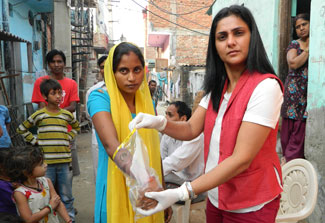Profile: Fogarty engineering fellow Dr Arti Kundu tests water purity in India
March / April 2016 | Volume 15, Issue 2

Photo courtesy of Dr. Arti Kundu
Fogarty fellow and engineer Dr. Arti Kundu studies the role of
unclean hands in water contamination in India.
By Cathy Kristiansen
Dr. Arti Kundu spends her days looking closely at dirty water. Trained in civil and environmental engineering - as well as public health - she applies problem-solving techniques to improve water quality and prevent disease around the world.
"Today's challenges in global health include providing clean water and enough food for people, and protecting vital ecosystems," Kundu said. "I believe the mammoth task of improving health in developing countries can only be achieved through multidisciplinary research."
Kundu is contributing to that varied approach with her engineering training and specialization in water. She has learned techniques for state-of-the art molecular diagnoses and computer modeling of the physical, chemical and biological processes in the environment. Scientists use models to compare different alternatives and strategies for environmental resources management. Kundu's doctoral thesis at the University of California, Davis focused on testing water for
E. coli, which poses a major bacterial threat in developing countries. "My engineering background helped when looking at a different way of solving a problem, such as contaminated water," she said. "I always tended to work on challenging issues, trying to find practical solutions." So far, she has participated in water studies in India, Thailand, Argentina, Israel and Alaska.
"Before working in India, I didn't do a lot of juggling different things at once, didn't know I was strong on that, to finish on time and write the paper. But in the Fogarty fellowship, I was completely independent. That gave me the opportunity to see how much I can do on my own. You feel very good when you can see you're making an impact on peoples' lives. I would like to keep doing that."
Dr. Arti Kundu
Fogarty Fellow
To develop as an independent researcher, Kundu applied for a fellowship from Fogarty's
Global Health Program for Fellows and Scholars. This initiative provides a yearlong mentored clinical research experience overseas for postdoctoral fellows and pre-doctoral scholars. She was accepted and for her research project, she investigated whether hands and drinking water in an Indian urban community were contaminated with
E. coli and had any association with household diarrhea. Each year, diarrheal diseases kill about 10 percent of Indian children under the age of five, according to the WHO.
Kundu partnered with a local nonprofit organization to select 152 households - each containing at least one young child - located on the outskirts of New Delhi. Her study included a questionnaire on the source of household water, handwashing habits and recent diarrheal symptoms. She also analyzed samples of drinking water - both at the source and in home storage vessels - and of hand surfaces. To obtain the latter, Kundu massaged each hand for 15 seconds in a separate bag of sterile water.
She discovered that source water from community pumps, municipal taps and commercial tankers was generally clean, but more than 65 percent of water in household storage vessels had fecal contamination. Additionally, she found a high correlation between gastrointestinal symptoms and the presence of
E. coli on family members' hands - especially the mothers'. Kundu shared her study results with affected households and visited local schools to teach the importance of handwashing and encourage each child with a gift of soap.
Kundu said she gained many new skills during her fellowship, by performing all the data and sample collection herself and operating in a challenging environment. She learned to manage her time and improvise. "Before working in India, I didn't do a lot of juggling different things at once, didn't know I was strong on that, to finish on time and write the paper," she said. "But in the fellowship, I was completely independent. That gave me the opportunity to see how much I can do on my own."
Among the logistical challenges she faced was ensuring the samples reached cold storage in her office within six hours, or the bacteria would start growing and distort the results. To avoid traffic delays, she started visiting households at 6 a.m., which in turn meant keeping cold-packs for the samples in her home fridge overnight to enable a quick start. "Everything was challenging, even getting sterilized water for the hand samples," she recalled. "I learned how to plan everything ahead."
Kundu intends to apply for an NIH career development award to advance her multidisciplinary research. "I want to continue to make changes in society, reducing diarrheal diseases," she said. "You feel very good when you can see you're making an impact on peoples' lives. I would like to keep doing that."
More Information
To view Adobe PDF files,
download current, free accessible plug-ins from Adobe's website.